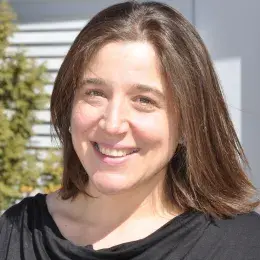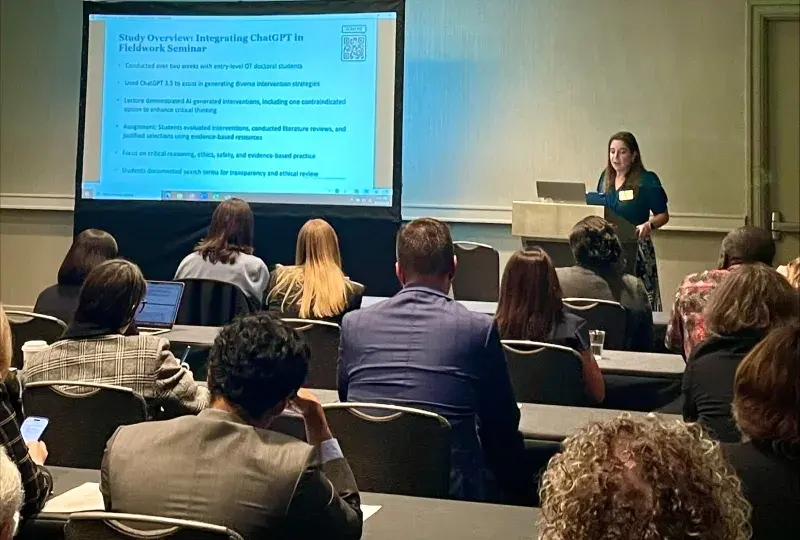
Dr. Tara Mansour, OTD, MS-HPEd, OTR/L, serves as an Assistant Professor and Academic Fieldwork Coordinator in the entry-level Doctor of Occupational Therapy program at the MGH Institute of Health Professions. With over 23 years of clinical experience, Dr. Mansour has transitioned into academia, where she champions progressive educational methodologies and interdisciplinary collaboration in occupational therapy and clinical education. She oversees fieldwork education, ensuring alignment with accreditation standards while developing innovative, experiential learning opportunities that prepare students for professional practice.
Dr. Mansour, a PhD candidate in Health Professions Education, investigates the continuum of learning experiences that prepare students for professional practice. Her scholarship includes studying ways to equip clinical instructors with the skills and resources needed to effectively teach and mentor students in practice settings, examining peer mentorship as a tool for growth in occupational therapy education, and integrating artificial intelligence into fieldwork education to strengthen learning and critical thinking. She is committed to developing strategies that empower students to grow as professionals, build confidence in their clinical skills, and navigate the transition to practice successfully.
Beyond her institutional role, Dr. Mansour is actively engaged in national service, contributing to the advancement of health professions education. She serves on the Clinical Education Committee of the Association of Schools Advancing Health Professions (ASAHP), working to shape best practices in clinical training across disciplines. At MGH IHP, she co-chairs the School of Health and Rehabilitation Sciences Clinical Education Committee, collaborating with faculty to support both our students and clinical site partners. In addition, she co-chairs the Generative AI Task Force, leading initiatives to explore and implement AI-driven innovations in health professions education.
Nationally recognized for her contributions, Dr. Mansour has presented at the American Occupational Therapy Association’s (AOTA) Education Summit and Academic Leadership Conference. She has also authored scholarly articles on the integration of AI in clinical education, including a publication in Frontiers of Medicine; on how educators can best support students’ needs while still preparing them for the demands of clinical practice in Medical Education; and most recently on supporting the professional development needs of clinical instructors in the Journal of Allied Health. In addition, she has implemented Balint groups in Level II fieldwork, providing structured peer discussions that enhance student reflection, empathy, and professional development. Through her work, Dr. Mansour is dedicated to advancing health professions education by leveraging innovative pedagogical strategies and technology to support the next generation of occupational therapists.
- BS, Therapeutic Recreation, University of Connecticut, Storrs, CT
- MS, Occupational Therapy, Tufts University, Medford, MA
- OTD, Post Professional, MGH Institute of Health Professions, Boston, MA
- MS, Health Professions Education, MGH Instiute of Health Professions, Boston, MA
- PhD Candidate in Health Professions Education, MGH Institute of Health Professions, Boston, MA
Fieldwork Education & Clinical Instruction
- Development and implementation of Innovative fieldwork experiences
- Supporting fieldwork educators in transitioning from expert clinicians to effective educators
- Balancing feedback, cognitive load reduction, and instructional differentiation for fieldwork educators & clinical instructors
Health Professions Education & Curriculum Development
- Innovative curricular design to enhance experiential learning
- Professional behavior development and student readiness for clinical practice
- Generative AI in Heath Professions Education
Research & Scholarship
- Investigating the impact of peer mentorship on OT students’ professional development
- Conducting qualitative research on the needs of clinical educators in rehabilitation sciences
- Publishing and presenting on topics related to fieldwork education, AI integration, and clinical education
Dr. Tara Mansour’s scholarly work represents the core of her scholarly focus on preparing and supporting future health professionals through innovative approaches to fieldwork education, curriculum design, and technology integration. Collectively, they highlight her commitment to bridging academic and clinical practice, strengthening the professional development of clinical educators, and leveraging generative AI to enhance learning, feedback, and readiness. Each piece reflects her ongoing effort to balance student-centered learning with professional rigor and to promote evidence-informed strategies that advance both teaching and clinical education across the health professions.
Mansour, T. & Thompson, A. (In press) Bridging the gap: Identifying challenges and enhancing professional development for clinical instructors in rehabilitation sciences. Journal of Allied Health.
Pittmann, R. & Mansour, T. (2025) Telesupervision: A scalable solution to clinical education placement shortages. National Academies of Sciences, Engineering, and Medicine’s Addressing Training Site and Slot Shortages Across Health Professions: Workshop Book of Abstracts.
Mansour, T. (2025). Student‐centered, not student‐catered education. Medical Education.
Mansour, T. (2024) Enhancing Fieldwork Readiness in occupational therapy students with generative AI. Frontiers in Medicine: Health Professions Education 11.
Mansour, T. (2024). Enhancing student empathy, engagement, and support: Balint and Level II fieldwork. OT Practice 29 (10), 18-12.
Larsen, G., Berner, K., Holland, A., Kieran, K., Lugo-Neris, M., Mansour, T., Wolf, A., & Gavini, N. (2024, November 8). Stroke rehab strategies and technological advances to improve QOL. Rehab Management
In addition, Dr. Mansour regularly presents at conferences and industry events. Please see her CV for a complete list of presentations.
Mansour, T. (2025, April 22) Using generative AI tools for content analysis: A tool for driving data-informed change in occupational therapy education. Pre-Conference Institute presented at AOTA Inspire 2026 Annual Conference & Expo, Anaheim, CA.
Mansour, T. & Wong, J. (2025, October) Transforming education and clinical practice with generative AI: Practical strategies for educators and clinicians. Instructional Course presented at the American Congress of Rehabilitation Medicine (ACRM) Annual Conference. Chicago, IL.
Mansour, T. & Thompson, A. (2025, October) From clinician to educator: Unlocking professional growth for clinical instructors. Poster presented at the Association for Schools Advancing Health Professions (ASAHP) Annual Conference. Indianapolis, IL.
Mansour, T. & Tanrikulu, O. (2025, October) Transforming feedback into action: AI-assisted qualitative analysis for curriculum improvement. Session presentation at the Association for Schools Advancing Health Professions (ASAHP) Annual Conference. Indianapolis, IL.
Mansour, T. & Geer, V. (2025, April) Enhancing Occupational Therapy Student Learning Experiences Through Peer Facilitation. AOTA National Conference. Philadelphia, PA, April 3-5, 2025


